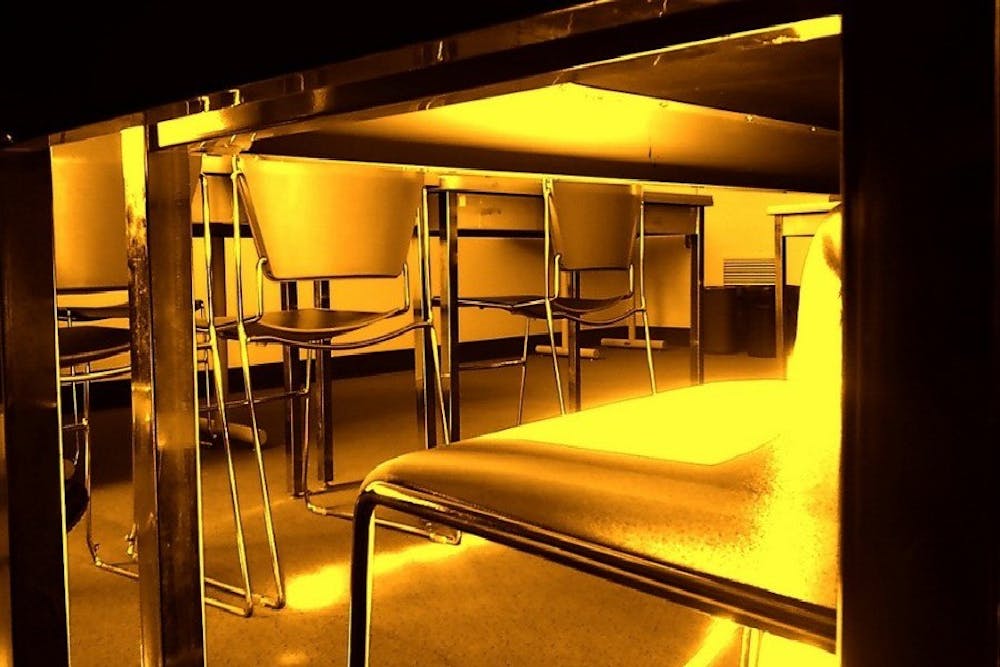By Jake Stanley, For The Miami Student
With the majority of academic courses conducting final examinations all in the same week, the daunting scheduling process falls in the lap of the Office of the Registrar and its class scheduling department.
"Final exams are a derivative of the class schedule," University Registrar David Sauter said. "It's a pretty set format."
Exams are scheduled based on the university's Standard Timeblock Model, and an alternating scheduling model is used each semester.
If a course offers three or four sections with a total minimum enrollment of 200 students, or five or more sections, it is scheduled for a group examination.
Twenty percent of all courses at Miami will utilize this method during next week's schedule.
This format has encouraged professors who teach multiple sections of the same course to create a uniform exam for all sections.
"I don't have any say on when my exams are scheduled," statistics professor Lynette Hudiburgh said. "But, it is nice for collaboration among different instructors who teach large sections."
However, the final for a course with lower student enrollment is determined by the course's traditional class meeting time. For example, a class offered on Tuesdays and Thursdays at 11:30 a.m. will have its final on Thursday, Dec. 11, at the regularly scheduled class time.
Prior to the start of the fall semester, Sauter's office organized data based on student schedules to determine which courses had the most conflicts. With this information, a fall exam schedule was released in July that allotted nine time blocks for group exams.
These blocks include mixtures of majors and courses that would not conflict with each other, with many involving multiple courses within a single major. The size of the courses and sections was later used to place each exam in an appropriately-sized room.
Sauter said a main objective of his department is to continually make improvements to the scheduling process.
Enjoy what you're reading?
Signup for our newsletter
"We want to eliminate back-to-back exams," Sauter said, "We also want to spread [the exams] out through the week and make it an 'exam week.'"
Despite the initiative to make exams a truly weeklong process, some students still feel as though their finals schedules are imbalanced.
"I have three exams on Wednesday," sophomore Kendall Donahue said. "They all seem to be put together."
In recent years, the university has made an effort to limit the amount of scheduling conflicts for students.
Currently, students can adjust their schedules if they have four or more exams on one day, but a recent decision by Associated Student Government will decrease that number to three, beginning in fall 2015.
Students can also make adjustments if multiple non-group exams are being held at the same time.
For these measures, courses with abbreviations nearest the beginning of the alphabet are moved to a later time. For example, a microbiology exam (MBI) would be moved to accommodate the schedule of a zoology (ZOO) exam. To move an exam, the divisional dean and instructor must give their approval.
Recently, professors have foregone the traditional final exam and begun to institute methods that lighten the load on students during finals week. Sauter said 40 percent of courses this fall are following this trend.
A change to this fall's schedule was the addition of a ninth group exam time block at 12:45 p.m. on Friday, Dec. 12. Students in Hudiburgh's STA 261 class will be taking their final in this block, which concerned her.
"I have many seniors in my classes and this final ends 15 minutes before commencement," Hudiburgh said. "I don't think that is necessarily right."
Sauter said interference from faculty is uncommon, but did confirm that some seniors will be taking exams close to the time of their commencement, which begins at 3 p.m. Friday.
However, he said this is an improvement from previous years, when some finals were scheduled during commencement, in which a graduating senior could miss the ceremony entirely.
Despite criticism of the process, Sauter said Miami's scheduling method decreases the likelihood of conflict, unlike other peer institutions.
"At other schools, if a professor teaches three sections of a math course, then he can schedule it whenever he wants," Sauter said. "Being policy-driven, we plan when all exams are and that they are two hours long."




